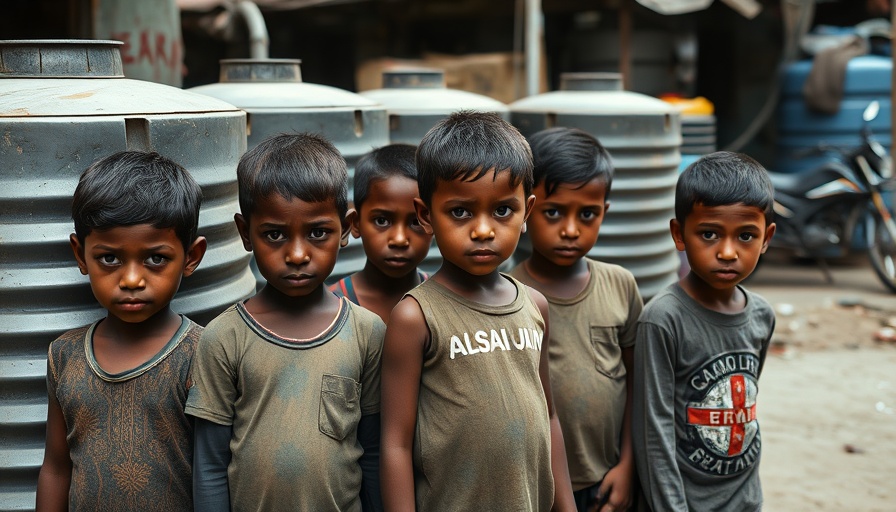
UNICEF’s Alarm: A Generation Displaced in Haiti
The ongoing crisis in Haiti is reaching a critical point as UNICEF reports that the number of children displaced due to violence has nearly doubled, now affecting approximately 680,000 children. With about half of the nation’s population of 6 million requiring humanitarian aid, the situation has escalated dramatically in recent months. This alarming trend is compounded by rampant gang violence, which has displaced 1.3 million Haitians, leaving many families crammed into makeshift shelters that often lack adequate safety and basic infrastructure.
Tragic Realities: Hunger and Homelessness
Overall, the living conditions for these homeless families are dire. UNICEF highlights that over 5.7 million people, including more than a million children, are facing acute hunger. Families like that of Geraldine Matha-Pierre, who has been living in a shelter after a gang raid on her community, symbolize the suffering endured by many. Matha-Pierre is a mother of two boys, ages 13 and 15, and struggles daily to find food, often relying on friends to help provide meals after losing her income as a trader due to the violence. “I’m hungry. My kids are hungry,” she laments, reflecting the despair many experience in this ongoing crisis.
The Educational Crisis: Children Missing School
Beyond hunger, over a quarter of all children in Haiti are out of school due to escalating violence. The recent UNICEF report mentions the closure of more than 1,080 schools this year, with factors such as armed group occupations severely disrupting education across the country. With 25 schools occupied by gangs and many others turned into shelters for displaced families, we see a heartbreaking trend: children missing their vital formative education years. Thousands of students, including Matha-Pierre's sons, are falling behind, potentially losing a chance at a brighter future.
The Humanitarian Response: Challenges and Risks
The crux of the humanitarian crisis lies in the difficulty of delivering aid. Limited access to communities controlled by gangs makes it nearly impossible for aid workers to reach families in desperate need. This raises critical questions about the effectiveness and safety of providing humanitarian assistance in conflict zones. For many families, securing therapy or medical assistance is also complicated by the dangers of violence and instability, which profoundly affects their mental and physical health.
Hope Amidst Despair: Community Responses
Despite the overwhelming adversity, local communities are stepping up to support one another. Initiatives from NGOs and community organizations aim to not only provide immediate relief, like food and shelter but also to work towards the long-term rebuilding of education systems and infrastructure. This community resilience illustrates a glimmer of hope, with collective action serving as a counterbalance to the acts of violence that have taken over their neighborhoods.
Future Predictions: What Lies Ahead for Haiti’s Children?
Looking ahead, the trajectory for Haiti’s children remains uncertain. Without significant international intervention and local stability, UNICEF warns that the cycle of violence and displacement may continue. Political instability and entrenched gang control challenge organizations attempting to offer assistance. However, heightened global attention to the crisis could represent a turning point, fostering hope for a comprehensive response that includes both immediate humanitarian aid and long-term solutions.
Why This Matters to Us: Reflection on Global Crises
As homeowners, renters, and community members in Davenport and beyond, this unfolding crisis in Haiti reflects the interconnectedness of our global community. It serves as a stark reminder that, although we may feel distant from these events, the implications of humanitarian crises resonate universally. Our actions, whether through advocacy, donations, or raising awareness, have the potential to effect change far beyond our localities.
The situation in Haiti significantly underscores the pressing need for global solidarity in response to crises. As we witness the courage and resilience of communities like Matha-Pierre’s amidst tremendous challenges, we are compelled to ask ourselves: What can we do as a community to support those in urgent need? It might include engaging with local organizations advocating for humanitarian relief, sharing knowledge about international issues affecting vulnerable populations, or encouraging political action to support global humanitarian efforts.
 Add Row
Add Row  Add
Add 




Write A Comment